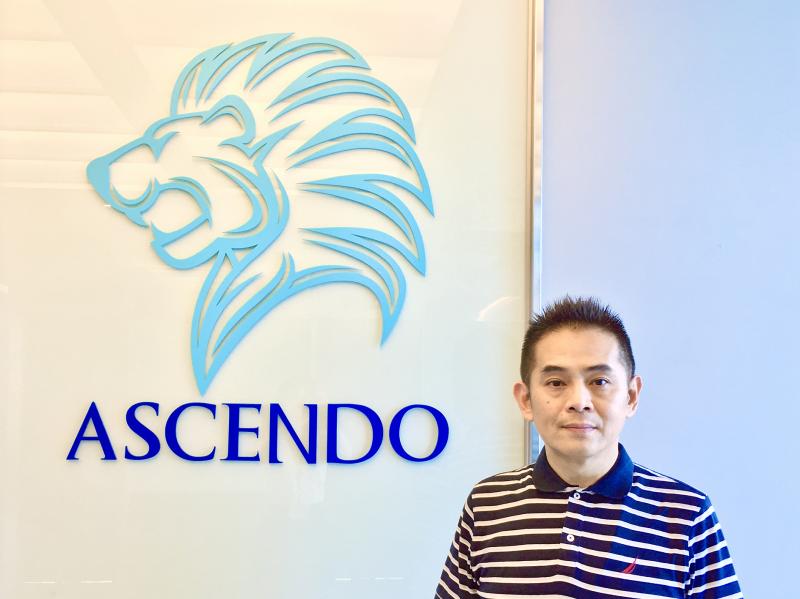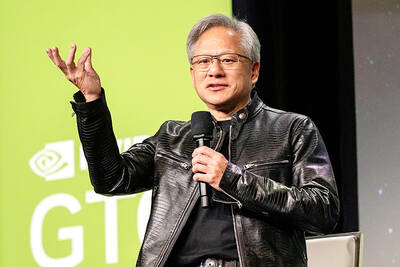Concern over COVID-19 stems not only from its high degree of virulence, but from its ability to continuously mutate and produce new variants. An effective vaccine can help slow the virus’ spread, but the question of how to deal with its continuous mutations is key.
Mass production of the most well-known novel coronavirus vaccines in production, including by AstraZeneca PLC, Moderna Inc and Pfizer Inc, has a high technological threshold, especially for those using messenger RNA (mRNA) technology, since manufacturers need to overcome the challenges of storage and transportation at ultra-low temperatures.
Founded in 2018, Ascendo Biotechnology Inc (先知生技) has a research and development team with 30 years of clinical drug research experience, focused on immune-related drug research.

Photo courtesy of Ascendo Biotechnology Inc
Using quantum mechanics technologies, Ascendo has developed a proprietary NanoCherubTM electric-kinetic nanocomplex antigen adjuvant and delivery platform, designed to rapidly respond to mutations without the challenges of ultra-low temperature storage and transportation, and to produce large quantities of vaccines quickly
‧ NanoCherubTM in the fight against COVID-19
Doctors and scientists have been racking their brains for a solution to the constantly mutating virus. Using quantum mechanics calculations, Ascendo can produce effective vaccines quickly, with a precise and flexible technology circumventing the need for the constant testing of more traditional approaches.
Last year, Ascendo started working with academic research institutions in Taiwan on developing a COVID-19 vaccine, for the first time using quantum mechanics technology to design a drug delivery system encapsulating antigens to form a positively charged nanocomplex, enabling immune cells to generate a strong and effective response to the NanoCherubTM Electric-Kinetic nanocomplex and achieving a balanced and robust Th1/Th2 immunity.
The ASD254 vaccine developed by Ascendo last year showed excellent results in animal studies using mice, which most closely replicate the symptoms of the novel coronavirus in humans.
All vaccinated animals received 100 percent immune protection when tested with the live virus. Ascendo soon plans to apply to the Food and Drug Administration for phase 1 human trials, hoping to enter mass production next year.
The drug delivery platform can significantly shorten development times and respond to virus mutations, and the NanoCherubTM Electric-Kinetic nanocomplex can consistently induce balanced and strong Th1/Th2 immunity against encapsulated antigens, including full pathogens, subunit proteins, peptides and messenger ribonucleic acid, with the added advantage of the vaccines only needing to be stored at 2°C to 8°C.
‧ Hepatitis B therapeutic vaccine completed in animal efficacy trials
Ascendo has also completed animal efficacy trials for its ASD253 vaccine for chronic hepatitis B. Following preclinical trials, Phase 1 human trials are to begin next year, when ASD253 is expected to become the world’s first vaccine for chronic hepatitis B.
The company also hopes to develop vaccines for HIV (AIDS), dengue fever, Zika and pan-influenza viruses.

‘DECENT RESULTS’: The company said it is confident thanks to an improving world economy and uptakes in new wireless and AI technologies, despite US uncertainty Pegatron Corp (和碩) yesterday said it plans to build a new server manufacturing factory in the US this year to address US President Donald Trump’s new tariff policy. That would be the second server production base for Pegatron in addition to the existing facilities in Taoyuan, the iPhone assembler said. Servers are one of the new businesses Pegatron has explored in recent years to develop a more balanced product lineup. “We aim to provide our services from a location in the vicinity of our customers,” Pegatron president and chief executive officer Gary Cheng (鄭光治) told an online earnings conference yesterday. “We

LEAK SOURCE? There would be concern over the possibility of tech leaks if TSMC were to form a joint venture to operate Intel’s factories, an analyst said Taiwan Semiconductor Manufacturing Co (TSMC, 台積電) yesterday stayed mum after a report said that the chipmaker has pitched chip designers Nvidia Corp, Advanced Micro Devices Inc and Broadcom Inc about taking a stake in a joint venture to operate Intel Corp’s factories. Industry sources told the Central News Agency (CNA) that the possibility of TSMC proposing to operate Intel’s wafer fabs is low, as the Taiwanese chipmaker has always focused on its core business. There is also concern over possible technology leaks if TSMC were to form a joint venture to operate Intel’s factories, Concord Securities Co (康和證券) analyst Kerry Huang (黃志祺)

It was late morning and steam was rising from water tanks atop the colorful, but opaque-windowed, “soapland” sex parlors in a historic Tokyo red-light district. Walking through the narrow streets, camera in hand, was Beniko — a former sex worker who is trying to capture the spirit of the area once known as Yoshiwara through photography. “People often talk about this neighborhood having a ‘bad history,’” said Beniko, who goes by her nickname. “But the truth is that through the years people have lived here, made a life here, sometimes struggled to survive. I want to share that reality.” In its mid-17th to

‘MAKE OR BREAK’: Nvidia shares remain down more than 9 percent, but investors are hoping CEO Jensen Huang’s speech can stave off fears that the sales boom is peaking Shares in Nvidia Corp’s Taiwanese suppliers mostly closed higher yesterday on hopes that the US artificial intelligence (AI) chip designer would showcase next-generation technologies at its annual AI conference slated to open later in the day. The GPU Technology Conference (GTC) in California is to feature developers, engineers, researchers, inventors and information technology professionals, and would focus on AI, computer graphics, data science, machine learning and autonomous machines. The event comes at a make-or-break moment for the firm, as it heads into the next few quarters, with Nvidia CEO Jensen Huang’s (黃仁勳) keynote speech today seen as having the ability to